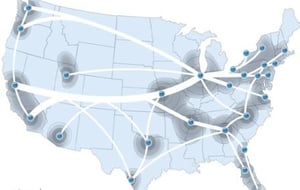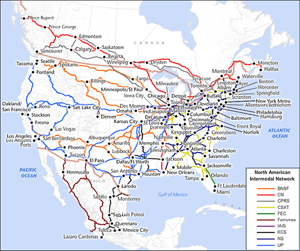
Temperature controlled freight comes with its challenges, with one being value priced capacity.
As food regulations and pharma standards increase on an already limited about of temp controlled shipping options, it becomes more important for shippers to open their horizons on where they can obtain temp-controlled equipment and solutions for commodities that need the refrigerated protection.
Whether it is to maintain 45 degrees or minus 10 degrees, there are other options outside of utilizing temp-controlled truckload & LTL capacity and that is to tap into both the COFC and TOFC intermodal market.
Temperature controlled intermodal has taken the back seat for many years to dry, but that story is changing.
Within the intermodal reefer market, TOFC (trailer on flatcar) has been the service of choice, with the reason being that it has been driven by supply created from refrigerated truckload providers putting their OTR trailers on the rail for long haul efficiency. This truckload motor carrier strategy has been more for carriers to manage their own network than selling it as a service offering into the intermodal reefer market.
While TOFC is more efficient than trucking the freight over-the-road (OTR), it is not as efficient as double-stacking COFC (container-on-flatcar) reefer boxes and is why the intermodal temp-controlled market is on the front end of changing.


The COFC option is driving a revolution and viability for more shippers to access reefer intermodal options.
Not only is COFC service more cost effective, but shippers have a better opportunity to tap into the temp controlled intermodal capacity because this equipment is in place to serve temp controlled shippers, not to optimize an OTR carrier operation.
The revolution in the COFC intermodal service is being driven by investment in equipment, facilities, technology and people.
The one shortcoming of COFC vs. TOFC is weight. A TOFC option can be loaded at a higher weight than COFC, so when you begin to investigate the potential make sure you include weight as part of the discussion.
From the technology perspective, systems monitor the container temperature to protect the product, while also giving peace of mind and providing trust in the service. The refrigerated intermodal containers are on a 24/7/365 satellite tracking; internal temperature monitoring; and the ability to remotely change the temperature of the containers in transit.
Reefer intermodal containers have roughly two to three times the capacity of fuel on the reefer units versus what is typically found on trucks, so if there were a delay the product is well protected.
Temp controlled intermodal also brings with it all the benefits of standard COFC intermodal service:
- Cost Savings
- Consistently, Reliable Service
- Truck, Plus a Day Transits
- Helps Answer the Capacity Question
- Each Load Reduces Carbon Emissions by 60% Compared to Truck and 30% Compared to COFC
- Drop Pools
As mentioned, 53' COFC temp controlled services are driving a revolution in the temp controlled 53' capacity market, so to take advantage of the opportunity we want to walk through some of the specifics on service, equipment and expectations.

53” COFC Intermodal Service
 Service Areas:
Service Areas:
- S. California / N. California to the Northeast
- Chicago, IL to S. California, N. California and Dallas, TX
- Dallas, TX to Chicago, IL, S. California and N. California
- Memphis, TN to S. California, N. California and Oregon
Equipment Specs:
- Interior Dimensions: 97” x 103” x 597.
- These intermodal container units will easily handle 28 single pallets or 56 stacked pallets.
- Available cargo weight: 40,000 lbs.
Benefits of 53’ Intermodal Refrigerated Containers?
- From an economic perspective, containers-on-flat-car (COFC) are more economical than truckload and trailer-on-flatcar (TOFC). The ability to double stack the COFC containers on a flatcar is what drives the economics.
- The COFC intermodal containers have wireless location tracking.
- Operators have full control of the refrigeration unit, while it is in transit. This allows for real-time 24/7/365 monitoring and having the ability to change the temperature in-route.
Trailer-on-flatcar, better known as TOFC intermodal service is also a temperature-controlled service option. The specifications of the service are a bit different, so take a look at the specifics.
53’ TOFC INTERMODAL SERVICE
 Service Areas:
Service Areas:
- The entire West Coast, plus Nevada, Arizona, North Carolina, Midwest and Northeast, along with the Toronto, Ontario and Montreal, PQ regions, and of course back to the west coast from each of the destination regions.
Equipment Specs:
- Interior Dimensions: 97-3/4” x 105-1/4” x 620”
- These units will handle 28 single pallets or 56 stacked pallets.
- Available cargo weight is 44,000 lbs., which is 4,000 more pounds of capacity than a COFC unit.
Benefits of 53’ TOFC Intermodal Service
- Expedited TOFC rail service available.
- 24/7/365 visibility for tracking, tracing and monitoring the performance of the refrigeration unit.
- TOFC units are able to be controlled remotely.
Conclusion
Temp-controlled truckload options are still the main capacity option for shippers, but hopefully you've found that COFC and TOFC intermodal service may be a fit for your company.
As you do further research on temperature controlled intermodal capacity options understand they continue to expand, so keep checking back with your intermodal provider to make sure you have the latest and greatest routing and pricing options available.
If you have been sitting on the sidelines of intermodal and would like to learn more, we invite you to read some of most read blogs on intermodal to help you through your decision of bringing intermodal to your company's logistics and supply chain strategy:
- Why Diversification of Truckload & Intermodal is Key to Logistics Success
- Intermodal Transportation - Beginners Guide and FAQ's
- Top 10 Intermodal Misconceptions: What You Need to Know
- Intermodal Weight - The Most Common Issue for Shippers
- 11 Differences Between Intermodal and Truckload Every Shipper Should Know
If you're ready to take the next step, at InTek Freight & Logistics, we can help. Just tell us what you need and we'll discuss how our expertise can help with the unique shipping challenges your business faces. Rather do a bit more research first? View our Freight Guides for comprehensive articles and eBooks on all things freight and logistics.
Get Updates
Featured Articles
Categories
- Freight & Shipping Costs (54)
- Freight Broker (60)
- Freight Forwarder (2)
- Intermodal Transportation (184)
- International & Cross Border Logistics (43)
- Logistics & Supply Chain (420)
- Logistics Service Provider (77)
- LTL (39)
- Managed TMS (49)
- News (39)
- Supply Chain Sustainability (12)
- Transportation Management System (37)
- Truckload (122)
- Warehousing & Distribution (50)




